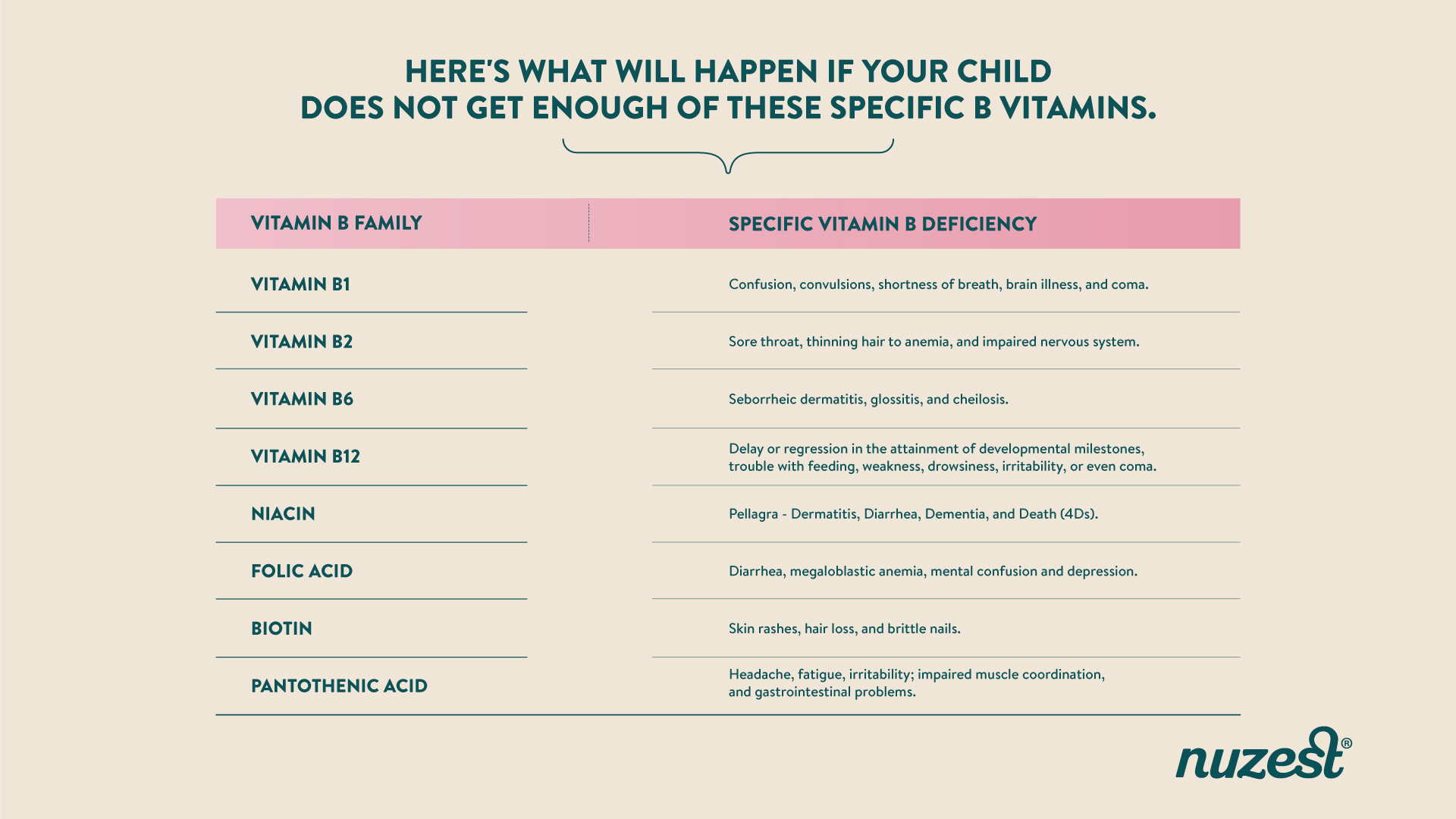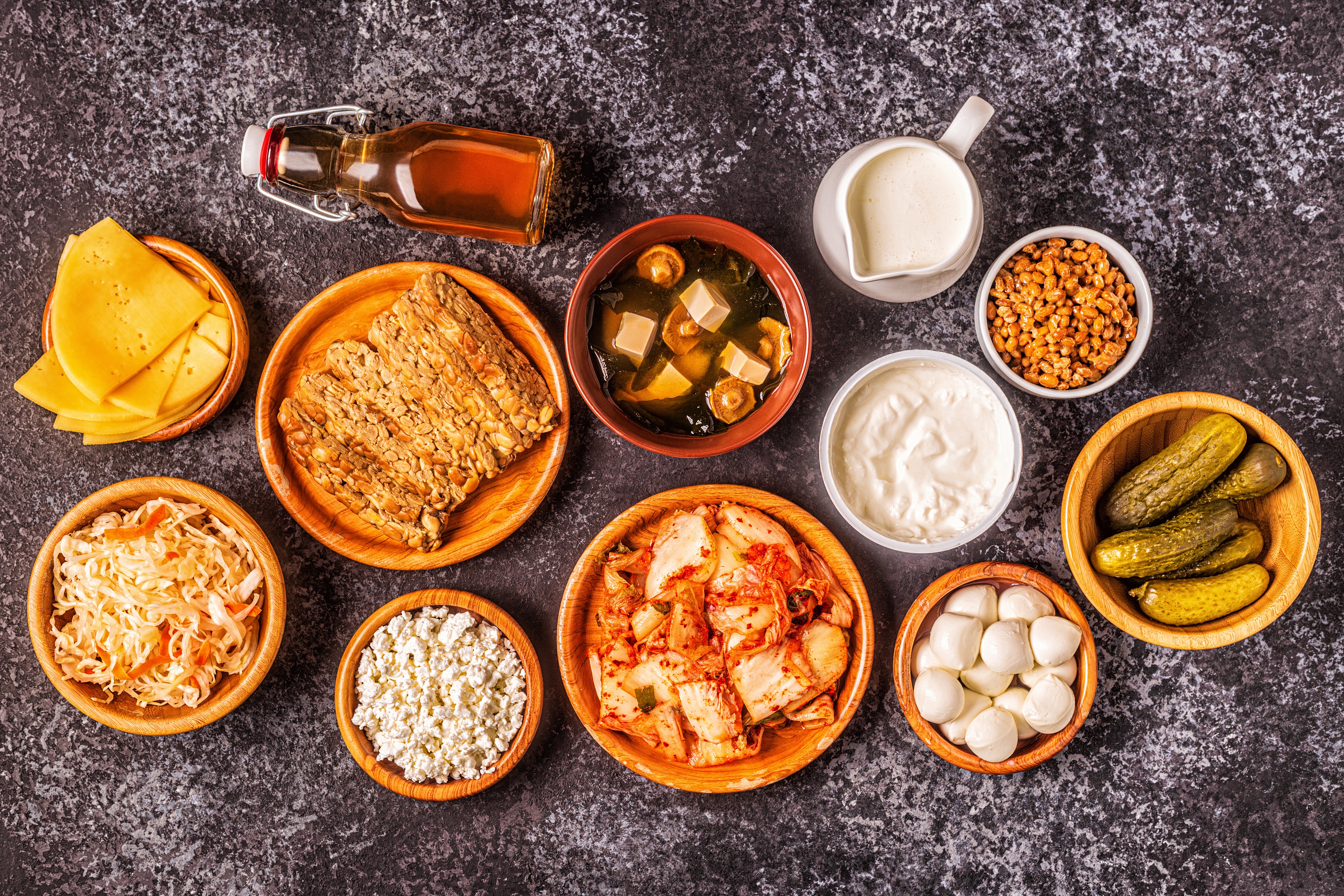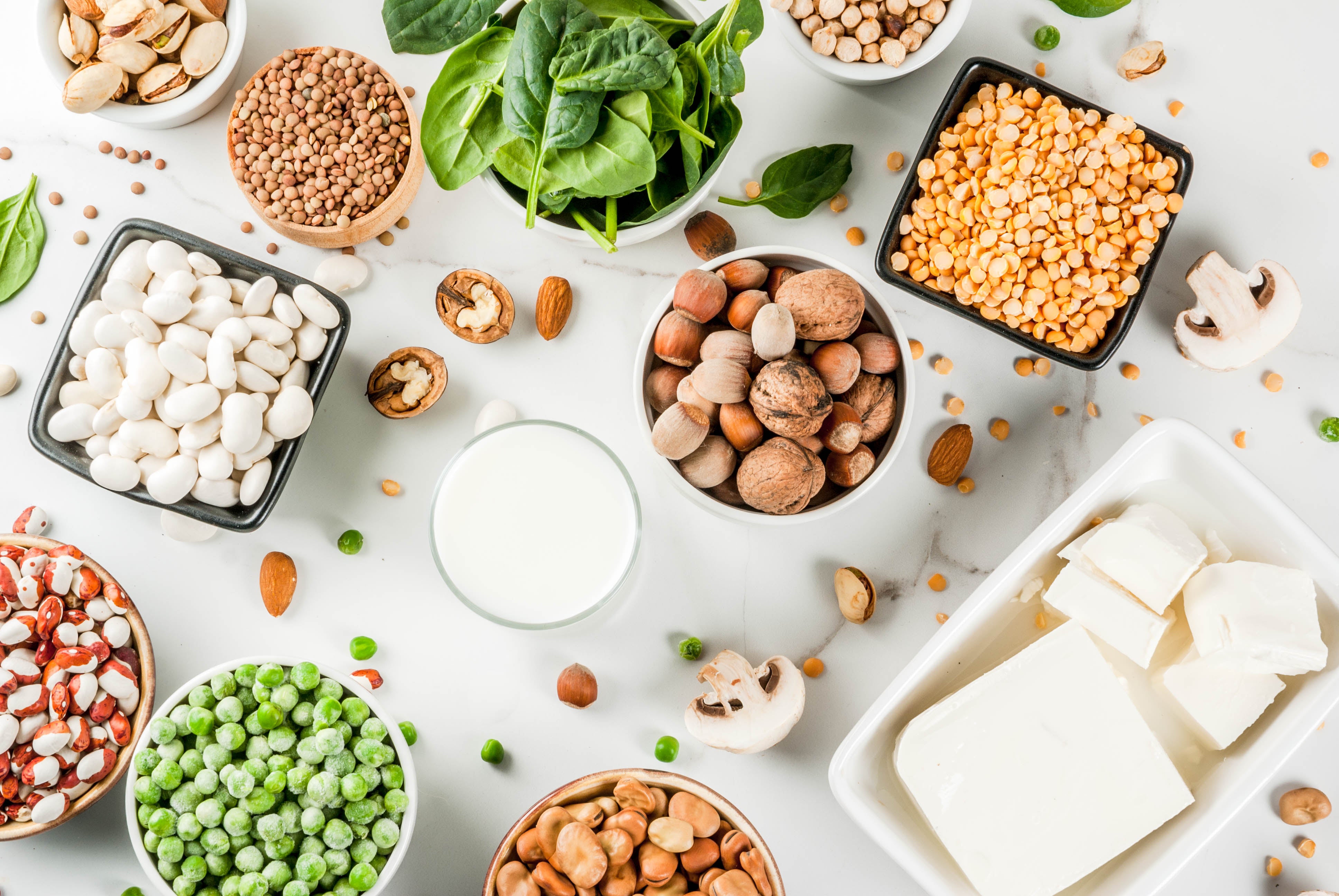As parents, your number one priority is your child's health and wellbeing. A significant challenge of parenting is dealing with a child's picky eating habits, which might put them at risk of illness due to vitamin deficiency. It may not be simple to make sure your kid eats all the right things at mealtime, but it's never too late to start. So, what are the good vitamins you should give to your kids?
Short answer: In order to grow, develop, and maintain excellent health, your child needs Vitamins A, B-complex, C, D, E, and K.
In this post, you'll understand what vitamins are, how they work, why they are crucial for your kid's health, daily recommended intake, vitamin deficiency, and food sources.
What Are Vitamins?
Vitamins are nutrients obtained from the food we consume. These are organic compounds that are required by the human body in minimal quantities. They are essential for the proper functioning of the body, which allows your child to continue to grow and be healthy. When it comes to vitamins, each and every one of them has a particular function.
Most vitamins cannot be synthesized by the body or are synthesized in relatively small quantities. Therefore, they must be obtained through diet.
What Are the Good Vitamins For Kids' Health?
You might be wondering: "What kind of vitamins should I give my kid?" First, let's identify the categories. There are two (2) different kinds of vitamins: fat-soluble and water-soluble.
Fat-soluble vitamins
All the fat-soluble vitamins are: A, D, E, and K. Fat-soluble vitamins are deposited in the liver and other fatty tissues. They are stored in the adipose tissue until they are needed by the body.
Yes, fat-soluble vitamins can stay stored in the body for an extended time. Then, when it is time to use them, the special transporters in the body take them to the part where they are required.
Let's examine fat-soluble vitamins in greater detail, from A to K.
Vitamin A
Vitamin A is a crucial nutrient that helps maintain healthy skin, hair, and eyes and also helps strengthen the immune system. Experts report that its antioxidant capabilities will shield your child from the dangers of free radicals.
Children who are infected with measles may benefit from taking a vitamin A supplement, according to the findings of a recent study. Vitamin A improves your child's ability to see colors, from the lightest yellow to the deepest purple.
What happens if a child doesn't get enough vitamin A?
Vision problems are a common symptom of vitamin A deficiency. Your kid might tell you it's hard to read in the dark. It's also possible that your kid will frequently become sick and complain of dry eyes, dry skin, and recurrent illnesses.
How much vitamin A does your kid need?
Children should get between 300 and 600 micrograms of vitamin A per day, depending on their age.
Food sources of vitamin A
- Beef liver
- Eggs Fish oils
- Fortified foods
- Fruits, i.e., cantaloupe and mango
- Leafy green vegetables
- Milk
- Orange and yellow vegetables
- Red bell pepper Tomatoes
Vitamin D
Vitamin D facilitates calcium absorption, essential for strong bones and teeth. An active form of vitamin D (calciferol) is created naturally during sun exposure, so having your child spend time outdoors may prompt him or her to produce more of it. Vitamin D can be found in fortified breakfast cereals, milk, and fatty seafood like salmon and mackerel.
What happens if a child doesn't get enough vitamin D?
Children may develop rickets if they don't get enough vitamin D. Rickets is an illness that makes bones thin, weak, and deformed.
How much vitamin D does your kid need?
It is advised that children ages 3 to 13 get 600 IU/day of Vitamin D.
Food sources of vitamin D
- Egg yolks
- Liver
- Fortified cereal
- Fish
- Milk and other dairy products fortified with Vit. D
Vitamin E
Vitamin E is an essential nutrient that performs a potent antioxidant function. Simply put, it helps to defend cells against the harm that can be produced by free radicals. These free radicals are suspected of being a factor in the development of cancer, cardiovascular disease, and cataracts.
What happens if a child doesn't get enough vitamin E?
Low levels of vitamin E have been linked to a variety of neurological issues, including the inability to sense pain, impaired motor coordination, and weakened muscles.
How much vitamin E does your kid need?
The recommended dietary allowance (RDA) for vitamin E in children is between 6 and 11 milligrams per day.
Food sources of Vitamin E
- egg yolks
- Nuts and seeds
- Whole grains
- Wheat germ
- Vegetable oils like sunflower, canola, and olive
- Leafy green vegetables
Vitamin K
Vitamin K is essential for blood clotting. When this happens, specific cells in your blood act like glue and adhere together at the surface of the wound to help stop the bleeding. This is one of the ways that your body heals itself.
Furthermore, Vitamin K aids in the synthesis of other proteins crucial to maintaining healthy blood, bones, and kidneys.
According to research, persons who have low bone density also tend to have low levels of vitamin K in their blood. It makes sense to focus on this vitamin during childhood, which is the "bone-building" stage of life.
What happens if a child doesn't get enough vitamin K?
Excessive bleeding is a symptom of a vitamin K deficiency. Remember that bleeding can occur in places besides the cut or wound. Other signs of bleeding include:
- Getting bruised easily
- Having small blood clots under the nails
- Mucous membrane bleeding
- Dark-black colored stools with blood
How much vitamin K does your kid need?
The daily recommended intake of vitamin K for children is 55mcg for 4-8 years old and 60mcg for 9-13 years old.
Food sources of Vitamin K
- Green leafy vegetables
- Soybean
- Canola oil
- Natto (fermented soybeans)
- Smaller amounts can also be found in meat, cheese, and eggs
Water-soluble vitamins
Water-soluble vitamins are vitamins that can easily be dissolved in water and cannot be stored in the body. Since they have no storage place in the body, they travel through the bloodstream. Thus, the excess amounts of eliminated by the body through urination.
Because of how quickly they can be flushed out of the body, water-soluble vitamins require regular replenishment. Among these vitamins are vitamin C and the Vitamin B complex: B1, B2, B6, B12, folic acid, biotin, pantothenic acid, and niacin.
Vitamin B complex
The B vitamin family is quite large. It includes B1, B2, B6, B12, niacin, folic acid, biotin, and pantothenic acid.
The B vitamins have a significant role in the functioning of the metabolism. To put it another way, they facilitate the process by which your body obtains energy from the food you consume. The production of red blood cells, which transport oxygen throughout the body, is also aided by this group of vitamins. These B vitamins also play a crucial role since oxygen is required by every cell in your body.
What happens if a child doesn't get enough vitamin Bs?
Here's what will happen if your child does not get enough of these specific B vitamins.

Food Sources of Vitamin B
- Whole grains, such as wheat and oats
- Leafy green vegetables
- Beans and peas
- Fish and seafood
- Poultry and meats
- Eggs dairy products, like milk and yogurt
- Fortified cereals
Vitamin C
Vitamin C, also known as ascorbic acid, assists in the speedy recovery of wounds and the maintenance of healthy gums and bones. This vitamin also aids the immune system in fighting off infections. In addition, it improves the digestive system and aids in the absorption of iron-rich foods.
What happens if a child doesn't get enough vitamin C?
The lack of vitamin C causes the blood vessels to become weak, which can lead to bleeding gums, more frequent nosebleeds, and bruises. In addition, it causes the body to produce less collagen, which slows the healing process of wounds and makes bones weaker.
Food Sources of Vitamin C
- Cruciferous vegetables (broccoli, Brussels sprouts, cabbage, cauliflower)
- Citrus fruits, i.e., oranges, kiwi, lemon, and grapefruit
- Cantaloupe
- Strawberries
- Tomatoes
- Kiwi fruit
- Sweet red pepper
- Bell peppers.
- White potatoes.
How To Boost My Child’s Vitamin Intake?
Dietary Approach
A diet rich in foods from the five healthy food groups is the best way to ensure your child gets adequate vitamins:
- Vegetables - Green leafy and yellow vegetables
- Fruits
- Grain foods – Bread, pasta, breakfast cereals, rice, corn, and so on
- Dairy products – Milk, yogurt, and cheese
- Lean meat, fish, poultry, eggs, tofu, legumes, and nuts.
In addition, you should limit their consumption of sugary and processed meals. The likelihood of nutritional inadequacies increases when they consume a diet high in sugar, carbohydrates, unhealthy fats, and sodium. Generally, a child's nutritional requirements can be met with a well-balanced diet.
Multivitamin Supplementation
Apparently, children who get a well-balanced diet may not require multivitamin supplements.
Unfortunately, it's common knowledge that many kids aren't big eaters. In the absence of this, some children, especially those who adopt a vegetarian diet or who have medical problems that can interfere with vitamin absorption, including cystic fibrosis or celiac disease, are at risk for nutritional deficiencies.
Because of these concerns, some pediatricians advise using multivitamins to protect children against the adverse effects of nutritional deficiencies and/or gaps.
As a friendly reminder, please keep in mind that taking more vitamins does not necessarily provide better results for some vitamins. This can lead to vitamin toxicity.
Our Take Away
Since various food sources contain different vitamins, you may simply supply your body with what it needs by eating a balanced diet. Eating a wide variety of foods is the best way to ensure that you're getting enough of each vitamin. Some children may benefit from a daily multivitamin, but most can get everything they need from a balanced diet.
Give the Vitamins Your Kids Need from Nuzest’s Kids Good Stuff.
Explore the potential of our Nuzest's Kids Good Stuff for your kids vitamin needs! Yes, your children can get the proper nutrition to support their overall health and well-being in just a shake away.
For every serving of our delightful and nourishing Kids Good Stuff, your kids could get this much of these amazing goodness!

Is your child a picky eater? Click here to find out what vitamins they need to boost their appetite!
Kids Good Stuff
Parents asked, we answered. Kids Good Stuff is the one-and-done nutritional support that growing bodies need.

Disclaimer:
The information provided on Nuzest is for educational and informational purposes only. The information provided on this site is not, nor is it intended to be, a substitute for professional advice or care. Please speak to your qualified healthcare professional in the event that something you have read here raises questions or concerns regarding your health.
















